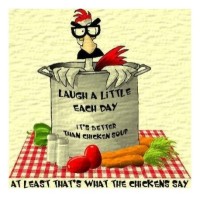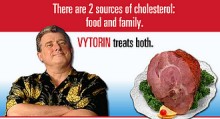 Null Hypothesis
Null HypothesisWhen we select a course of action, we are implicitly considering hypotheses. Suppose we feel strongly that chicken soup alleviates the symptoms of a cold and shortens its duration. We want to prove that chicken soup is more effective than doing nothing. The null hypothesis would be that chicken soup has no measurable effect. The alternative hypothesis is that chicken soup alleviates the symptoms of a cold and shortens its duration.
The next step is to gather evidence (data) that allows us to reject the null hypothesis. The null hypothesis is essentially the status quo. If we do not have enough evidence to reject the null hypothesis, we will continue as before. On the other hand, if we reject the null hypothesis, we are faced with changing lots of things: raising and killing more chickens, increasing our crops of materials that are components of chicken soup, etc. In other words, there is a lot of effort in making a change and such effort is justified only if there is strong proof that the new way makes a significant improvement.
Alternative Hypothesis
In case the null hypothesis is rejected, we need to be prepared to conclude that something else happened. We could have an alternative that chicken soup makes it worse, chicken soup makes it different, or chicken soup makes it better. We would like to pick a reasonable alternative. In this case, the most reasonable alternative is that chicken soup makes it better.
Subsequent Action
If we believe that we have obtained reliable evidence that chicken soup is an effective remedy for the common cold, then we should act on that belief. For instance, we could invest in a chicken farm, a chicken processing plant, a soup manufacturing facility, and a marketing firm to enlighten the population. If we made an error (Type I because we rejected a true null hypothesis), then we will probably lose all we invested and owe lots of money for years to come. The mistake will be costly and we set the probability of making such an error purely by chance at the low level of 5 times out of 100. If we make the other error (Type II if we accept a false null hypothesis), then we lose the chance to make a fortune but keep our shirts.
Examples
 Vytorin
VytorinTwo large drug companies wanted to prove that Vytorin was the drug of choice to lower both cholesterol and reduce the need for valve surgery. Based on their statements and approval by the FDA, the drug was marketed at a high price to patients. Health insurance companies paid large sums to cover the treatment. They tested the null hypothesis that vytorin was no different (= null) from other drugs. However, the evidence collected did not allow experimenters to reject the null hypothesis.
Iraq's Nuclear Program
The Bush administration strongly supported going to war with Iraq. In running a test to justify their desire, the null hypothesis would have been that Iraq was not doing anything different (= null) in their military activities from what they did before. That is, they had not changed their operations to produce nuclear weapons. Based on what now was obviously a biased interpretation of the scant evidence available, Bush rejected the null hypothesis (at a statistical level much greater than 5%) and accepted an unreasonable alternative. That mistake was very costly to the United States, to many other countries, and to an unknown number of persons. (Bush showed us how relevant it is in the real world to use hypotheses to explicitly
Reference: Hypothesis testing, Null Hypothesis, Null Hypothesis
Click